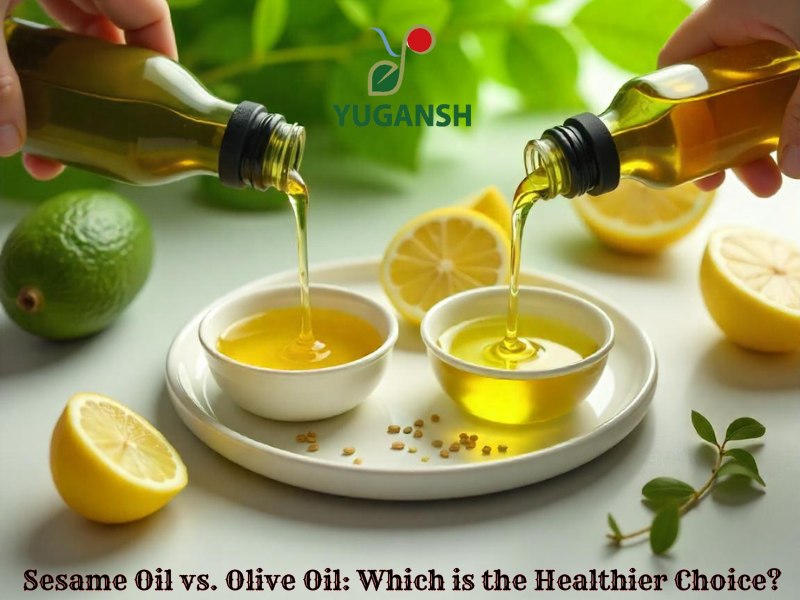When it comes to health-related oil, some people just go for either sesame or olive oil. The reasons include a great many benefits with each one of them; however, there is more to say about their qualities and health impact. So the comparison will help in finalizing between both options.
What Is Sesame Oil?
Sesame oil is extracted from sesame seeds. It is used frequently in Asian cooking. Its flavour is mild and nutty and is commonly added to stir-fries. There are two primary kinds of sesame oil: untoasted and toasted. Toasted has a darker colour with a richer flavour.
Furthermore, cold-pressed sesame oil is extracted by pressing the seed without heat. This manner retains its nutrients. Wood pressed oil is another method by which extraction is done. It is more traditional as well as produces a fuller taste.
What Is Olive Oil?
Olive oil is extracted from a fruit native to the Mediterranean area that gets pressed out from olives. This forms an important ingredient in Mediterranean cuisine. Olive oil possesses a distinct taste and has many applications. The flavors go from light, fruity flavors to robust.
Cold-pressed olive oil is even better because it is of higher quality. Since no heat is involved in its production, its nutrients and antioxidants are well preserved, meaning it maintains its natural taste and is healthier.
Health Benefits of Sesame Oil
Sesame oil is nutrient-rich and hence has various health benefits. This oil contains loads of antioxidants that fight off all the damage to your body. Two different chemical constituents, sesamin and sesamol, exist in this oil, which make this oil anti-inflammatory in nature. Hence, it is rich in polyunsaturated fats, which are good for the heart.
Sesame oil contains vitamins E and K, among others. Vitamins E and K support skin health and clotting, respectively. Additionally, sesame oil is rich in magnesium, which contributes to bone health and allows for the reduction of blood pressure, thus improving cholesterol levels.
Health Benefits of Olive Oil
Olive oil is heart-friendly in nature. It contains a lot of monounsaturated fats that help decrease the levels of bad cholesterol. However, olive oil also contains antioxidants, vitamin E, and polyphenols. These antioxidants protect the body from bad free radicals.
Olive oil is anti-inflammatory and reduces the risk of chronic diseases. It is said that olive oil can avoid heart diseases, stroke, and type 2 diabetes. Additionally, it will help maintain healthy skin and even help in weight management.
Comparison: Sesame Oil vs. Olive Oil
While the two oils come with different advantages, which do they have in health terms?
Fatty Acid Content
Olive oil has a higher proportion of monounsaturated fats, which is good for heart health. However, sesame oil contains more polyunsaturated fats, which is also good for reducing bad cholesterol levels.
Antioxidants
Olive oil is very high in antioxidants, including polyphenols, which have been linked to a multitude of health benefits. Sesame oil contains antioxidants, too, but is more specific in terms of sesamin and sesamol. Therefore, these compounds also are quite potent, working to protect the body from oxidative stress.
Taste and Usage
Olive oil has a lighter, fruitier flavour. It is fantastic in dressings, salads, and sautéing. Sesame oil possesses a nutty flavour to match Asian dishes. In most stir-fries, marinades, and dressings, sesame oil is the preferred option.
Heat Tolerance
Sesame oil has a higher smoke point compared to other oils. It has a better option for use in stir-frying or frying. Olive oil is ideal for medium-heat cooking or served as a finishing touch, especially in salads or dips.
Which is Better for Cooking?
When selecting the oil for cooking, the smoke point of the oil comes into play. Sesame oil has a lower smoke point than olive oil. Therefore, it is perfect for low to medium-heat cooking methods, such as sautéing. For example, extra virgin olive oil has a smoke point of about 375°F (190°C), while sesame oil has a much lower smoke point.
However, cold-pressed sesame oil is typically used to flavour rather than cook in high heat. It can add a rich nutty taste to Asian dishes, dressings, and marinades. Sesame oil is really good when stir-frying or sautéing.
Which Is the Healthier Choice?
The decision depends on personal health goals and food preferences. Olive oil should be preferred as it is great for heart health. Monounsaturated fats in olive oil, along with antioxidants, make it good for cardiovascular health.
Furthermore, sesame oil is a good choice for people who require a variation of nutritional intake. Sesame oil can provide polyunsaturated fats as well as magnesium and vitamins E and K. The best variety of nutrient retention would be through cold-pressed sesame oil.
Olive oil is a good option if you’re looking to cut down on inflammation or keep blood pressure in check. Its anti-inflammatory compounds coupled with heart-healthy fats make it a pretty powerful choice.
Conclusion
Both sesame oil and olive oil have health benefits and can be incorporated into one’s diet. If you want to enhance your heart health and the antioxidant intake in your food, then olive oil is the way to go. If you’re looking for a flavoring oil full of several nutrients, then cold-pressed sesame oil might just do the trick.
Furthermore, both oils can be incorporated into your cooking to reap different health benefits. Therefore, both should be used in different types of foods based on their different characteristics. Always choose cold-pressed oils for most health benefits, as they will retain more nutrients than refined oils. Finally, both oils are healthy in their own right; the choice depends upon your personal preference and nutritional needs.


